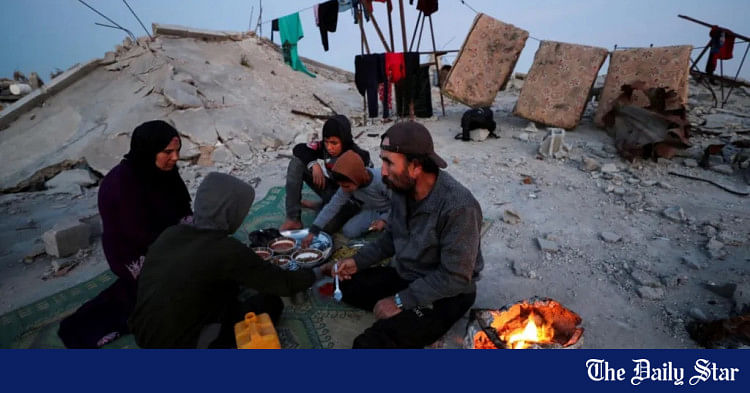Arab leaders meet to hash out Gaza plan as Hamas urges against displacement
AFP
Cairo
Published: 04 Mar 2025, 22: 34
Syria's interim President Ahmed al-Sharaa (CR) and Foreign Minister Asaad al-Shibani (R) meet with the President of the European Council Antonio Costa (CL) in Cairo on 4 March 2025, on the sidelines of an Arab League summit on Gaza. AFP
Arab leaders gathered in Cairo Tuesday to discuss an alternative to US President Donald Trump's widely condemned plan to assume control of war-battered Gaza, with Hamas urging them to "thwart" efforts to displace Palestinians from their land.
The Arab League summit on reconstruction follows renewed backing of Trump's plan from Israeli Prime Minister Benjamin Netanyahu, who labelled it "visionary and innovative".
The war in Gaza was sparked by Hamas's 7 October 2023 attack on Israel, whose retaliatory offensive left the territory largely in ruins and created a humanitarian crisis that only recently began to abate with the start of a fragile ceasefire in January.
"We look forward to an effective Arab role that ends the humanitarian tragedy... and thwarts the (Israeli) occupation's plans to displace" Palestinians, the militant group said in a statement.
Trump triggered global outrage when he first floated his idea for the United States to "take over" the Gaza Strip and turn it into the "Riviera of the Middle East", while forcing its Palestinian inhabitants to relocate to Egypt or Jordan.
Palestinians, Arab states and many European governments have rejected Trump's proposal, opposing any efforts to expel Gazans.
Trump has recently appeared to soften his stance, saying he was "not forcing" the plan, which experts have said could violate international law.
In his opening remarks on Tuesday, Egyptian President Abdel Fattah al-Sisi said his country's plan would ensure Gazans "remain on their land", saying the territory would be run by a committee of Palestinian technocrats.
Draft plan
A draft version of the Egyptian plan seen by AFP lays out a five-year roadmap with a price tag of $53 billion -- about the same amount the United Nations estimated Gaza's reconstruction would cost.
A proposed early recovery phase, expected to last six months and cost $3 billion, would focus on clearing unexploded ordnance and debris, and providing temporary housing, according to the draft.
That would be followed by a $20 billion initial reconstruction stage running until 2027 and focusing on rebuilding essential infrastructure and permanent housing.
The next stage of reconstruction, extending to 2030 at an estimated cost of $30 billion, aims to build more housing, infrastructure, and industrial and commercial facilities.
The plan proposes an internationally supervised trust fund to ensure efficient and sustainable financing, as well as transparency and oversight.
An Arab League source previously told AFP a plan "would be presented to Arab leaders at Tuesday's summit for approval".
Several Arab heads of state are participating, along with foreign ministers and other high-level representatives.
Among them were Palestinian Authority leader Mahmud Abbas and Syrian interim President Ahmed al-Sharaa, participating in his first Arab summit since toppling Bashar al-Assad last year.
De facto Saudi ruler Crown Prince Mohammed bin Salman, however, is not attending, sending his top diplomat instead, state media said.
As far and away the Middle East's largest economy, Saudi Arabia's backing would be essential to any regional reconstruction effort.
Ceasefire impasse
The talks in Cairo are taking place as Israel and Hamas find themselves at an impasse over the future of the ceasefire in Gaza.
The truce's first phase ended at the weekend, after six weeks of relative calm that included exchanges of Israeli hostages for Palestinian prisoners and an influx of badly needed aid into the territory.
While Israel said it backed an extension of the first phase until mid-April, Hamas has insisted on a transition to the second phase, which should lead to a permanent end to the war.
Hours before the summit opened Tuesday, Israel's top diplomat Gideon Saar said it demanded the "total demilitarisation of Gaza" and Hamas's removal in order to proceed to the second phase of the ceasefire deal.
Hamas leader Sami Abu Zuhri rejected the demand, telling AFP: "The resistance's weapons are a red line for Hamas and all resistance factions."
Gaza has been under a crippling Israeli-led blockade since Hamas took power there in 2007, with critics of Israel often likening the territory to an open-air prison.
In a speech to parliament Monday in which he hailed Trump's plan, Netanyahu said: "It's time to give the residents of Gaza a real choice. It's time to give them the freedom to leave."
The idea of clearing Gaza of its inhabitants has been welcomed by far-right members of Netanyahu's coalition such as Finance Minister Bezalel Smotrich, who has called for Israel to "establish full sovereignty there".
As the truce's first phase came to a close, Netanyahu's office announced Israel was halting "all entry of goods and supplies" into Gaza, and that Hamas would face "other consequences" if it did not accept the truce extension.
The move has drawn criticism from key truce mediators Egypt and Qatar, as well as from other regional governments, the United Nations and some of Israel's allies.



www.tasnimnews.com











































